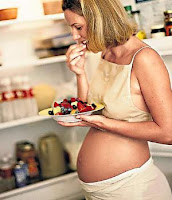This week I received the following question from
http://foodpicker.org
Friday nights my family & I have dinner at our favorite pizza restaurant. Now that I've been diagnosed with diabetes I don't know what to order. Could you help me with what (if anything) I can order?
There are definitely items you can find to eat at the pizza restaurant. Don't let diabetes stop you from your friday family nights. It's just going to take small adjustments. Because pizza is a carbohydrate food then it will require some attention regarding your diabetes.
Typically for a meal it is good to aim for about 45-60g Carbohydrates (3-4 servings of Grains)
If the pizza restaurant is a chain company then you may be able to find the amount of carbohydrates per slice on their website or by calling their corporate office.
If not, MyPyramid suggests that
- 1/8 medium thick crust pizza = 30g Carbs
- 1/8 medium thin crust pizza = 15g Carbs
This allows you to have about 3-4 slices of thin crusts or 2 slices of thick crust. Keep in mind the amount of calories pizza can provide when toppings are added on. You can reduce calories and fat by asking for no cheese on the pizza. I'm lactose intolerant and always ask for no cheese. It tastes just like a breadstick with dipping sauce! Also try a veggie pizza and load the pizza with carb-free vegetables which adds great nutrients at a low calorie expense.
You could also order a salad (try with oil based dressing) before your pizza comes out to help fill you up
.



